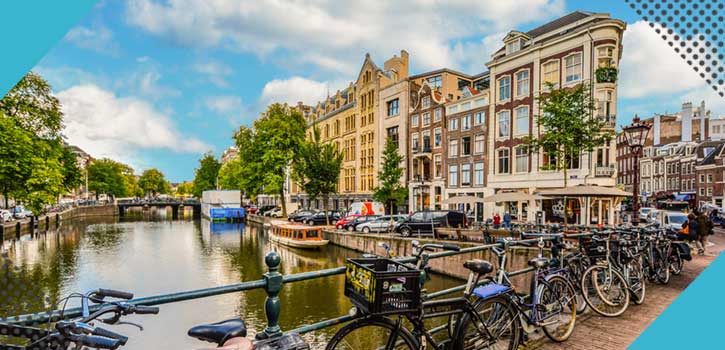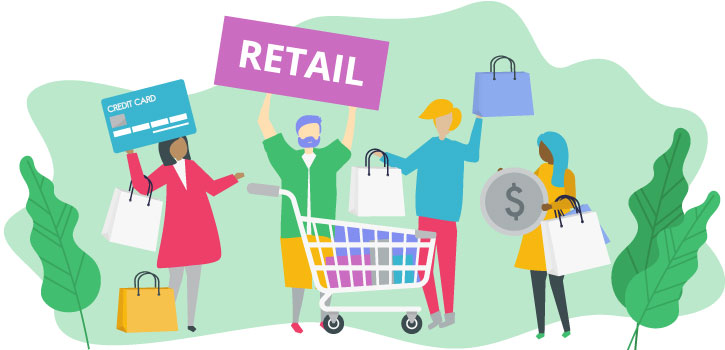The Netherlands may well be a small country, but it doesn’t stop it from being one of the world’s major economies. Covering 41,543km2 of land with a population of 16,947,904 according to a census in 2016: that’s 408 inhabitants per km2 (one of the highest figures in Europe), this “doorway to Europe” houses 51% of all European distribution centres.
A population of qualified polyglots, pragmatic legislation, a business culture and its strategic geographic location are all key factors which have made the Netherlands a major worldwide player. A real hub for international business, it’s worth finding out a little about the Netherlands if you want to do well and set-up over there.
1. The Netherlands: a country with great economic health
Despite the financial recession, the Dutch economy has remained stable and consumers have stayed positive. The unemployment rate was recorded at 6.9% in 2015 (compared to 11.7% for the European Union) and inflation at 1% (compared to 0.5% for the EU.) The UK is one of the Netherlands’ best trading partners: the land of tulips exports $40 billion worth of goods to the UK and imports $21.3 billion of British products.
With Rotterdam’s huge port (the largest port in Europe), this country is resolutely outward facing to the rest of the world. In fact the Netherlands is the 6th biggest exporter in the world, and 2nd largest in the agrifood industry.
Translation and Localisation of a Website: download our free e-book
2. Several growth sectors, including e-commerce
The transport and logistics industry is one of the country’s largest industries. However, 8 other industries also offer great commercial opportunities: 1. High-tech Systems, 2. Water Management, 3. Chemistry, 4. Energy, 5. Creative 6. Agrifood, 7. Flowers, 8. Life Sciences & Health.
Then there’s e-commerce: with 99% of the population been connected (Internet or mobile), the Netherlands shows no signs of slowing down. 57% of the population even access the Internet daily via two different devices. This industry has seen turnover take off from 16% in 2016, and with 18% of e-commerce transactions happening on mobile phones, it represents real opportunity.
The strong Dutch interest in online buying explains the progressive increase in spending on digital advertising. In 2015 digital advertising represented 36.6% of all advertising spending in the Netherlands. The prediction for 2019 is at 43.5%.
44% of this population would also like the experience to be the same, regardless of the distribution channel they choose: in store, online or via a mobile device. Omnichannel retail is then, very important for consumer experience.
If you are tempted by the e-commerce industry, you should know that contrary to the UK, Flemish and Dutch people don’t use credit cards as their main source of payment, and they don’t fill in debit card information online. They use the tool iDEAL instead. 60% of internet transactions are carried out using this system, which is basically like a direct bank transfer. iDEAL secures the transaction both for the buyer and vendor. Payments are duly taken in less than 24 hours (but most of the time it’s done instantly) and must be processed, which considerable reduces the risk of fraud. As this tool is the main payment option in the Netherlands, you will have to familiarise yourself with it if you intend to trade in the Netherlands.

You should also take into account delivery terms: in the Netherlands most of the large e-commerce websites offer same day delivery if you order before 2pm. If you order before 11pm, your order will arrive the next day. So you will have to be extra vigilant when it comes to delivery methods if you want to stay in the race. What is more, consumers attach great importance to free delivery and free returns.
3. Highly educated, demanding consumers with great purchasing power
The Dutch people have a high standard of living: a GDP per person estimated at €39,367 in 2015, placing them 12th in the world (the UK comes in at 21st). This doesn’t mean consumers are any less demanding and careful with their purchases; spending is closely linked to the quality of the product, but also to ethics and the transparency of the company they are buying from.
Trust is the cornerstone of any purchase in the Netherlands. Customer services in Dutch companies is very ‘client focused’ as over there, the customer is always right! To be sure they are buying from the right place, Dutch consumers are happy to do their research on companies and brands online. For this reason a company’s reputation should be worked on down to the last detail, including via social media and community management.
Dutch consumers are willing to pay the price of their stringent demands: a fact demonstrated by their buying power, they are not afraid to pay the price if they feel confident in the buying process and are sure that the product is well-designed and made: that it contains few chemicals, is not damaging to their health or the environment, and is made by workers who are treated fairly etc.
4. Legislation and tax policies that favour investors
> What legal status should your company have?
In the Netherlands there are two types of limited company (where shareholders are liable for social debts to the extent of their contribution to the capital):
‘Private’ limited liability companies (LLC), called BV (Besloten Vennootschap)
- Can be founded with a minimum paid-up capital of 1€.
- Shares can only be transferred according to the approval clause in the company’s articles of association requiring either prior authorisation at a shareholder’s AGM or another decision-making board, or preferential rights for the other shareholders.
‘Public’ limited liability companies called NV (Naamloze Vennootschap)
- Can be founded with a minimum capital of 45,000€.
- Their shares can be listed.
Since 2004, there has also been a new type of commercial company: An SE or European limited company. The characteristics are the same as an NV in the Netherlands, except for the fact that a SE can transfer their head office to another member state. An NV can become an SE but a BV can’t (it would have to become and NV first).
> Progressive, versatile taxation
Foreign companies only pay taxes on a certain proportion of earnings, notably those coming from secondary establishments or estate income. The tax rate is progressive: 20% on the first 25,000 euros, 23% on the 25,000 to 35, 000 euro bracket and 25.5% above 35,000 euros.
5. A different cultural approach
Above all else, there are 5 keys things to remember about the Dutch: punctuality, pragmatism, simplicity, trust and openness.
> Punctuality and efficiency at business meetings
Meetings are well planned with little flexibility to shorten or lengthen them: efficiency is the order of the day when it comes to professional meeting in the Netherlands, it’s even more important than being friendly.
> Efficiency above all!
It may seem to lack a little human warmth at first, but unlike France, for instance, where personal life easily blends with professional, the Netherlands remains pragmatic on the question of efficiency.
> An open nation with horizontal business hierarchy
At work, no matter what position you hold, you’re always asked for your opinion. Relationships between workers and their bosses is informal, equality reigns and managers are usually called by their first names.
> When a contract is in place (even a verbal one) they keep their word
Don’t be surprised: in the Netherlands verbal agreements are as binding as written ones. They commit and stick to it. However, to avoid any misunderstandings it is always worth confirming any verbal agreements you make about premises in writing.
> Simplicity is key
A Dutch business card may be fairly simple, but that doesn’t mean the card holder has any less weight in their company.
> Flemish and Dutch: not the same thing!
Communication for companies wishing to launch in the Netherlands should at the very least be in English: ideally in Dutch and Flemish too. It’s true: Dutch and Flemish aren’t the same, it isn’t like American and British English!
GOOD TO KNOW:
✔︎ Make the most of assistance programs created by the Netherlands to help foreign investors to launch. Find these on www.subsidieshop.nl or consult a local accountant or solicitor.
✔︎ The main towns (The Hague, Amsterdam, Rotterdam etc.) also have dedicated offices to help companies with finding premises, permits, legal matters etc.
✔︎ It is also worth checking out the Chamber of Commerce at www.knk.nl and the Netherlands Foreign Investment Agency website: www.nfia.nl
✔︎ The Netherlands are fond of building permits: on average entrepreneurs need 12 permits per year. You will also need an establishment permit for the building, installation and transport industries as well as the agrifood industry.
You may require a construction permit (bouwvergunning) or an environmental permit (milieuvergunning). Get in touch with the city you want to set-up in, some of them have created integral permits (integrale vergunning) to make things easier.
To find out more about technology to help you accelerate your international expansion download our free e-book!







